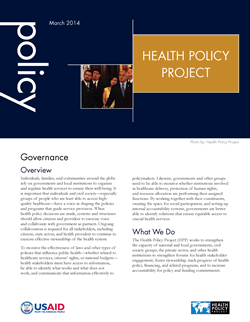The Health Policy Project ended in 2016. Work continued under Health Policy Plus (HP+) until 2022.
Governance

Alex Akuffo
Overview
Individuals, families, and communities around the globe rely on governments and local institutions to organize and regulate health services to ensure their well-being. It is important that individuals and civil society—especially groups of people who are least able to access high-quality healthcare—have a voice in shaping the policies and programs that guide service provision. When health policy decisions are made, systems and structures should allow citizens and providers to exercise voice and collaborate with government as partners. Ongoing collaboration is required for all stakeholders, including citizens, state actors, and health providers to continue to exercise effective stewardship of the health system.
To monitor the effectiveness of laws and other types of policies that influence public health—whether related to healthcare services, citizens’ rights, or national budgets—health stakeholders must have access to information, be able to identify what works and what does not work, and communicate that information effectively to policymakers. Likewise, governments and other groups need to be able to monitor whether institutions involved in healthcare delivery, protection of human rights, and resource allocation are performing their assigned functions. By working together with their constituents, creating the space for social participation, and setting up internal accountability systems, governments are better able to identify solutions that ensure equitable access to crucial health services.
What We Do
The Health Policy Project (HPP) works to strengthen the capacity of national and local governments, civil society groups, the private sector, and other health institutions to strengthen forums for health stakeholder engagement, foster stewardship, track progress of health policy, financing, and related programs, and to increase accountability for policy and funding commitments.
Our programs work with ministries of health, parliamentarians, civil society groups, and healthcare providers to support participatory processes in developing, implementing, and monitoring inclusive health policies to promote accountability, transparency, stewardship, and ownership of policy initiatives.
HPP governance initiatives cut across family planning and reproductive health, HIV, and maternal health programs. We develop individual and institutional capacity across multiple sectors to engage stakeholders in health policy development, generate and use evidence more effectively, and create and sustain systems to improve accountability for policy action and, ultimately, improve health outcomes.
Publications and Resources
Health Policy Project Governance Activities and Accomplishments - 2013
Health Policy Project Governance Activities and Accomplishments - 2012
Incentivizing Performance: Applications for Conditional Grants in Kenya's Health System
This brief, produced by the USAID- and PEPFAR-funded Health Policy Project, provides an introduction to conditional grants and how Kenya can use them to strengthen its health systems during the transition to a devolved system of government and a decentralized health infrastructure.
HIV Policy Analysis and Advocacy Decision Models for Key Populations
The model identifies policies that most directly affect access to key services and opportunities to improve access.
The GAP Tool: Gather, Analyze, and Plan
The GAP Tool identifies funding gaps and helps monitor progress in family planning programs.
Southern and East African Parliamentary Alliance of Committees of Health website
HPP partner website where parliamentarians from southern and eastern Africa track commitments to family planning in their countries.
Report: Designing an Effective HIV Discrimination Monitoring, Reporting, and Referral System: International Best Practices and Current Policy, Practice, and Opportunities in Ukraine
Report on international best practices and research on existing legal codes and systems in Ukraine to determine priorities for monitoring discrimination.
Case Study: Parliamentarians in Malawi Examine Impacts of Rapid Population Growth
By investing in family planning, the Government of Malawi could save U.S. $751 million in education and U.S. $1.5 billion in health over a 30-year period.
News
Strengthening Health Governance for Human Rights
The Washington, DC chapter of the Society for International Development convened a forum titled “Strengthening Health Governance for Human Rights” to explore this topic, both conceptually and through practical examples from the field.
Information System Helps Manage Social Services in Guatemala, Gains Government’s Support
Software tool helps identify health and education needs of citizens in poorest areas.
Repositioning Family Planning and Reproductive Health in Africa
Parliamentarians reinforce commitment to strengthening health systems in their countries.
National Institutes in India Use Computer Software Models to Evaluate Health and Family Planning Policy Options
HPP and Government of India partnership for evidence-based decision-making on policy options, decentralized health planning, and financing for family planning and reproductive health programs.


